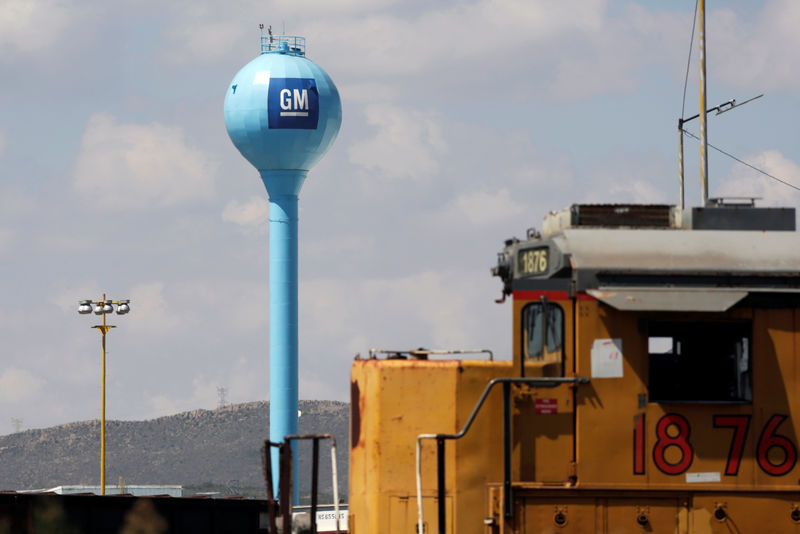By Nick Carey and Ben Klayman
DETROIT (Reuters) - General Motors Co (NYSE:GM) on Tuesday posted a stronger-than-expected quarterly profit on robust U.S. demand for its lucrative pickup trucks and SUVs, offsetting the $3-billion hit from a U.S. labor strike that led it to slash its earnings forecast.
Wall Street analysts have viewed the strike costs as a tradeoff for three U.S. plant closures agreed to with the union that will boost GM's profitability. Shares in GM were up 4.3% in midday trading.
"The underlying business was strong this quarter," Chief Financial Officer Dhivya Suryadevara told reporters at GM's headquarters, describing the strike as a "one-time impact."
Last Friday, the 48,000 United Auto Workers union members at GM ratified a new four-year labor deal with the Detroit company, ending a 40-day strike. RBC Capital Markets analyst Joseph Spak in a research note called the deal's financial impact "manageable."
The Detroit-based automaker reported a 6% increase in third-quarter U.S. sales, led by its highly-profitable full-size pickup trucks, SUVs and crossovers that helped it race to a strong profit margin of almost 11% in North America. It's that underlying business that has investors excited.
"Frankly, I'm as emboldened as ever," said Chris Susanin, co-portfolio manager at Levin Easterly Partners, which owned more than 4 million GM shares at the end of June. "I don't see why this stock isn't north of $100 (a share) in a couple years."
Virtually all of the pre-tax profits came from its North American business and its captive finance arm.
In China, where GM reported a 17.5% drop in third-quarter sales, the company's equity income fell 40% to $300 million.
It was the fifth straight quarterly sales decline for GM in China, the world's largest auto market, where the industry is expecting a second consecutive annual sales drop.
The China Association of Automobile Manufacturers expects a 5% decline in industry sales in 2019, then contracting or growing slowly over the next three years.
"It (China) remains volatile," GM CFO Suryadevara said. Last week, GM's smaller U.S. rival, Ford Motor (NYSE:F) Co, cut its forecast for operating profit for the year after a disappointing quarter hurt by higher warranty costs, bigger discounts and weaker-than-expected performance in China.
GM said the strike by the UAW had cost it $1 billion in pre-tax profits in the quarter, or 52 cents per share. CFO Suryadevara said the automaker lost around 300,000 units of vehicle production during the strike. GM will not recover most of that loss in 2019 and any recovery next year will be dependent on U.S. market demand.
The union wrung higher pay and other benefits from GM as part of the deal to end the strike.
Under the deal, GM will invest $9 billion in the United States, including $7.7 billion directly in its plants, with the rest going to joint ventures.
The No. 1 U.S. automaker said the full-year impact of the strike would be around $2 per share, or around $3 billion.
GM said it now expected full-year adjusted earnings per share between $4.50 to $4.80, down from its previous forecast of $6.50 to $7 per share.
The company said it now expected full-year adjusted automotive free cash flow in a range from zero to $1 billion, down from its previous forecast of $4.5 billion to $6 billion. GM's adjusted automotive free cash flow stood at $2.4 billion at the end of the third quarter. The strike reduced cash flow for the year by about $5.5 billion.
GM also cut its projected 2019 capital expenditures to around $7.5 billion from its previous outlook of $8 billion to $9 billion. Suryadevara said no plans were cut and the lower spend was due to operating efficiencies.
GM will provide more detailed forecasts for 2020 early next year, but Suryadevara said one expected 2020 challenge will likely be lower U.S. industry sales.
The automaker posted third-quarter net income of $2.3 billion, or $1.60 a share, down from $2.5 billion, or $1.75 a share, a year earlier. Excluding one-time items, GM earned $1.72 a share. Analysts had expected $1.31, on average, according to IBES data from Refinitiv.

Revenue fell slightly to $35.47 billion from $35.79 billion, above analysts' estimates of $33.82 billion.